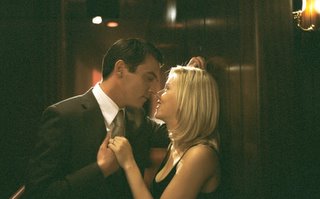
Promise is a Chinese fairytale that has all the ideas and images a western expects from a Chinese myth. A poor girl is offered a chance from a goddess. She is offered the chance to be the most beautiful woman of the world and to attain fame and riches. In return everyone she will love will lose to death. The girl takes up the offer only to regret it, when she is old. Her lover manages to turn back time and offer her the opportunity to choose again her destiny.
If the spectator accepts from the beginning the fact that he watches a fairy tale and suspends his disbelief he will be able to enjoy the beautiful symbolic images that the film offers. For example the girl when is captured by the evil duke is kept in a golden bid cage and is dressed in white feathers. Another astounding idea and image is the one of the slave of the duke. A man captured and forced to serve in exchange for his live. He wears a cape made of black feathers which keeps his severely injured body alive. When he gives up the cape his body bursts up in flames.
Promise is a film that is definitely well thought aesthetically. Every scene is a beautiful painting, colorful and magic. On the other hand, it has no meaning, no soul. It doest manage to move the spectator.
According to Chinese Philosophy ever person has a destiny, a fate that he can not change. He can, though, make different choices. He can’t change his fate all together and be something completely different but he is offered some important choices. Making though a choice and committing to a path means that he has to face the consequences of his choice. He cant evade them. Promise is a film that supports this idea. And it is a fairy tale because it offers her heroine a second chance in order for her to reconsider her choice since through time she gained the knowledge of her own future. A second chance that few of us get in real life.


